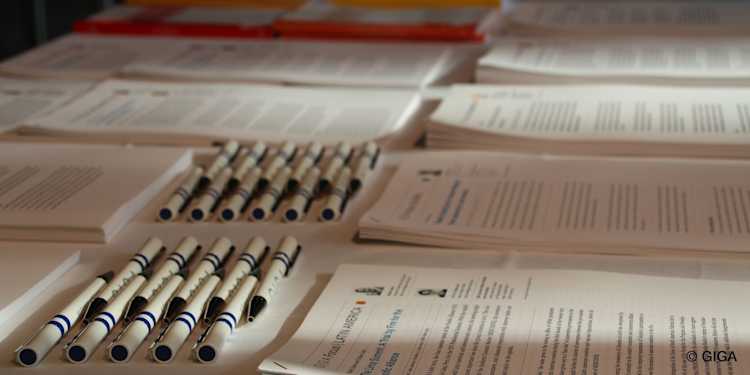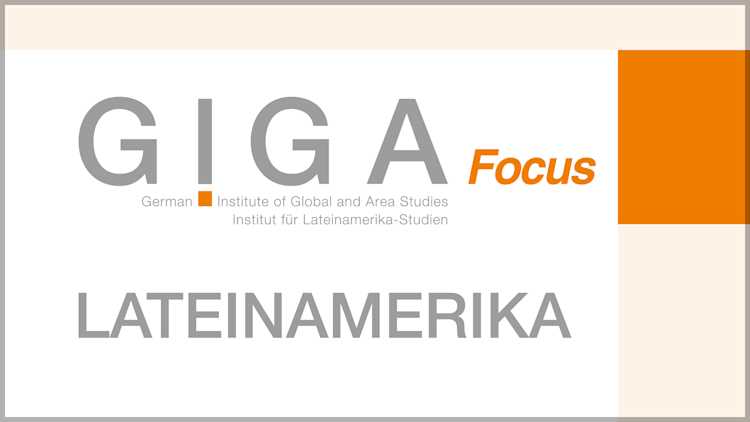- Home
- Publications
- GIGA Focus
- Internationale Rechtsprechung in Grenzkonflikten: der Fall Chile – Peru
GIGA Focus Latin America
Internationale Rechtsprechung in Grenzkonflikten: der Fall Chile – Peru
Number 1 | 2014 | ISSN: 1862-3573
Am 27. Januar 2014 verkündete der Internationale Gerichtshof (IGH) in Den Haag nach über sechs Jahren seinen Schiedsspruch zur Seegrenze zwischen Chile und Peru: Keiner der Staaten bekam vollständig recht, aber beide Regierungen sind zufrieden und wollen das Urteil umsetzen.
Analyse Im Januar 2008 hatte die peruanische Regierung beim IGH eine Klage gegen Chile eingereicht, um eine Festlegung der zwischen beiden Ländern umstrittenen maritimen Grenze zu erwirken. Aus Sicht der chilenischen Regierung war diese Grenze bereits in den trilateralen Verträgen der beiden Staaten mit Ecuador von 1952 und 1954 festgelegt worden.
Die bilateralen Beziehungen zwischen Chile und Peru sind traditionell von Rivalität in der Außen- und Sicherheitspolitik geprägt.
Der chilenische Präsident Sebastián Piñera (2010-2014) hatte sich jedoch entschlossen, die Initiative Perus aufzugreifen und eine zweigleisige Politik zu verfolgen: Der Konflikt um die Seegrenze wurde an den IGH delegiert, während davon unabhängig die bilateralen Handelsbeziehungen vorangetrieben werden sollten.
Peru warb international um Verständnis und Unterstützung für seine Position, während Chile allein auf das Urteil des IGH setzte.
Obwohl beide Regierungen auf einen politischen und juristischen Sieg setzten, sicherten sie von Anfang an zu, das Urteil des IGH zu respektieren und umzusetzen.
Gesten des guten Willens halfen, Spannungen im Vorfeld der Entscheidung gering zu halten und so die Anerkennung und Umsetzung des Urteils zu erleichtern.
Footnotes
Regional Institutes
Research Programmes
How to cite this article
Wehner, Leslie (2014), Internationale Rechtsprechung in Grenzkonflikten: der Fall Chile – Peru, GIGA Focus Latin America, 1, Hamburg: German Institute for Global and Area Studies (GIGA), http://nbn-resolving.de/urn:nbn:de:0168-ssoar-374490
Imprint
The GIGA Focus is an Open Access publication and can be read on the Internet and downloaded free of charge at www.giga-hamburg.de/en/publications/giga-focus. According to the conditions of the Creative-Commons license Attribution-No Derivative Works 3.0, this publication may be freely duplicated, circulated, and made accessible to the public. The particular conditions include the correct indication of the initial publication as GIGA Focus and no changes in or abbreviation of texts.
The German Institute for Global and Area Studies (GIGA) – Leibniz-Institut für Globale und Regionale Studien in Hamburg publishes the Focus series on Africa, Asia, Latin America, the Middle East and global issues. The GIGA Focus is edited and published by the GIGA. The views and opinions expressed are solely those of the authors and do not necessarily reflect those of the institute. Authors alone are responsible for the content of their articles. GIGA and the authors cannot be held liable for any errors and omissions, or for any consequences arising from the use of the information provided.







